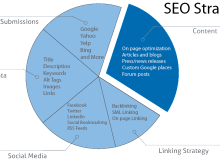The Google Algorithm that Runs the Search Engine
We are all familiar with the phrase ‘Google it’, but have you ever thought about what does Google do? How does it give back the results you want so fast? The answer is simple – Google uses its unique, complex and innovative search algorithm,  and it is the reason behind Google’s massive success and dominance as the most powerful search engine over years.
and it is the reason behind Google’s massive success and dominance as the most powerful search engine over years.
So, How Google Algorithm Works?
When you hit the ‘Search’ button in Google Homepage, Google uses an automated program that searches for ‘clues’ to return precisely what you want. Didn’t quite get it? These automated programs are called “bots,” “crawlers” or “spiders” and they crawl through all the world-wide-web’s active webpages. Next they start to build up an index of all those web pages that include specific keywords and phrases.
One of the most significant features of Google algorithm is perhaps the PageRank (PR) system. Formulated by Larry Page and Sergey Brin, PageRank is a link analysis protocol which formed the foundation of the early ‘Google’ search engine and was the primary deciding factor of the rankings of webpages on Google. How this process works is that PR algorithm allows a rank to each and every search result based on the usage of keywords. The higher the webpage’s rank, the further up the SEP’s list it’ll appear.
Over the years, several factors were included to prevent rank manipulation, and the significance of PageRank has warned though it has always been a primary ranking factor. An SEO Company in Chicago can be hired to help a business rank in Google’s algortim- See more at: http://googlewavecommunity.com/#sthash.s76E8aTa.dpufThe best example is Google Panda Update that has put more emphasis on top-quality website content. Therefore the content on a webpage should not only be fully relevant to the search terms, but should also be well-written (no grammar or spelling errors, ideas and concepts well-structured and well-presented), informative and authoritative, and ideally in-depth. So, any website with ‘blah-blah’ on it won’t survive, and creating content for the humans – and not for web-bots – is a lot more crucial than ever.
Recent Major Google Updates
Updates in Google’s algorithm impact website’s traffic drastically. Recent updates like Panda, Penguin, Hummingbird, etc. made almost all the website owners nervous. Let’s look at why it was so.
Panda, 2011 – designed to target websites that publish poor, irrelevant and key terms-stuffed content and also penalize those sites if possible.
Penguin, 2012 – to put emphasis on and correct ‘against-the-law’ SEO practices – Rewarding white-hat SEO and penalizing/banning black-hat SEO.
Hummingbird, 2013 – reacts to long-tailed and whole questions and statements like how a man would by seeing the question as a whole, and not splitting its keywords or small phrases.
Pigeon – This is the newest and officially nameless update but has been nicknamed as ‘Pigeon’. This update focuses more on local or regional search and delivers a more tailored Google listing relative to your location. This targets Chicago SEO Companies like www.chicagowebsitedesignseocompany.com
Google’s search algorithm is often refined and tweaked by engineers to yield higher-quality results. They are well known for throwing out flawed sites. This can be something you would not want to happen to your site or your clients’. So, make your webpages high quality, authoritative, user-friendly and then get other high-quality websites to hyperlink to it, and you won’t fail.

